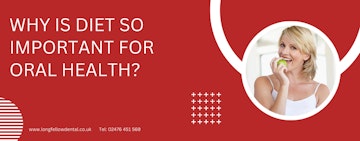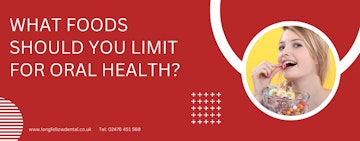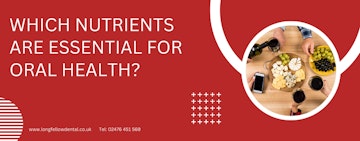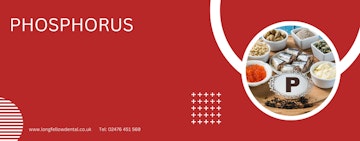
Diet Matters More than Brushing for Strong Teeth: Here’s Why
When we think about the steps we take to maintain good health, we often think about brushing, flossing and taking regular trips to the dentist. But as a proportion of our time, these steps are actually a small part of the bigger picture. How you care for your teeth between these steps could actually have a much bigger impact on your oral health.
Like a person trying to lose weight can’t out-train a poor diet, someone trying to care for their teeth can’t brush away the effects of poor nutritional choices. Whether it’s having too many sugary sweets, or missing out essential nutrients from your diet, there are ways you can damage your oral health that have nothing to do with how often you brush.
In this guide, we’re going to look at the everyday steps you could be taking that have a significant impact on your oral health and the simple adjustments that could help to reverse the damage.

Why is diet so important for oral health?
You can follow all of the popular oral health instructions, including brushing twice a day, flossing your teeth, using mouthwash and visiting the dentist for regular checkups. But if your diet is high in sugar and you regularly snack between meals, you’ll be fighting an uphill battle. Likewise if your diet is lacking in key nutrients for oral health.
Your teeth are living tissue that need nutrients to be able to remain strong and free from decay. Without a varied diet filled with vitamins and minerals, you will struggle to maintain good oral health. Poor diet can also lead to gum problems, and your gums need to remain healthy to be able to support your teeth.
The body is a complex system, and it’s not enough to simply intervene by cleaning your teeth twice a day. You also need to be committed to putting the right nutrients into your body, and avoiding too much of the things that can damage your teeth.

What foods should you limit for oral health?
It’s not just what you eat but also how you eat that can be a cause for concern. Eating a diet that is high in sugar and fizzy drinks can have a significant impact on your oral health.
Sticky and hard sweets that get stuck in your teeth should generally be avoided or enjoyed as a very occasional treat. You should also think about limiting your enjoyment of starchy foods that can get stuck in your teeth, like crisps and white bread.
Food and drink that dry out your mouth should also be avoided. This includes very salty or sour snacks.
As mentioned above, it’s not just what you enjoy but also how you enjoy it. Snacking between meals has a significant impact on your oral health. This is because food can get stuck between your teeth and you won’t produce the same volume of saliva as you would with a main meal. Saliva is triggered by hunger, so if you are snacking out of boredom, you’ll leave your teeth exposed to damage.

Which nutrients are essential for oral health?
Calcium
Perhaps the most well-known of the essential nutrients for oral health, calcium gives bones their strength, which helps to support teeth structures and the jaw. If you’re enjoying a glass of wine at a dinner party, you can limit the damaging effects of the acidity by simply enjoying a piece of cheese alongside your wine. The calcium in the cheese can help to protect your teeth enamel and remineralise the surface.
Vitamin C
This vitamin helps the body to synthesise collagen in dentin. It also helps to support oral health by protecting your gums from conditions such as gingivitis and scurvy. This is most commonly seen in people who do not have access to enough fresh fruits and vegetables.
Potassium
This compound helps to support bone density and bolsters your body’s defences against illness. It also supports wound healing and helps to make blood clots, so it can be beneficial for those suffering from bleeding gums.

Phosphorus
This compound combines with calcium to create hydroxyapatite, the main building block in enamel. It’s also crucial for helping the body to absorb calcium from food. Vitamins and minerals often work together and cannot be used in isolation to achieve good oral health.
Vitamin A
This vitamin supports the production of keratin, which is present in tooth enamel. It also helps to prevent dry mouth and protects your mucous membranes.
Vitamin D
This nutrient helps the body to absorb calcium from your diet and also helps to increase mineral concentration in the bones. This is essentially allowing your body to “stockpile” calcium from your food.
Vitamin K
This vitamin bonds calcium to your bones and teeth and helps to stop them from becoming brittle. It also aids in the synthesis of osteocalcin, which helps you to develop and maintain healthy bones.

Call us to make your appointment
Interest-free credit available
Worried about the cost of treatment? We offer financing plans to allow you to spread the cost.